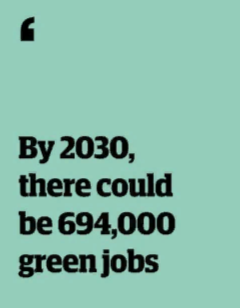Ahmedabad
(Head Office)Address : 506, 3rd EYE THREE (III), Opp. Induben Khakhrawala, Girish Cold Drink Cross Road, CG Road, Navrangpura, Ahmedabad, 380009.
Mobile : 8469231587 / 9586028957
Telephone : 079-40098991
E-mail: dics.upsc@gmail.com

Context: The shift to low-carbon development initiatives offers unique opportunity to India while also presenting a gender disparity challenge.
Gender Disparities in Green Jobs in India
Occupational Concentration
• Green jobs, spanning manufacturing, construction, renewable energy, and automobiles, have historically seen lower representation of women, reflecting persistent occupational divides.
• Under-representation in renewable energy sector
• Despite India commendable 250% increase in renewable energy capacity from 2015 to 2021, women remain vastly underrepresented in sectors like the solar rooftop industry, comprising only 11% of the workforce.
STEM Graduates and Sectoral Representation
• While 42.7% of STEM graduates in India are women, they represent only 30.8% in key sectors for the green transition, including engineering, manufacturing, and construction.
• It raises concerns about increasing number of women pursuing STEM education, who face barriers to enter fields crucial for the countrys sustainable development.
What are the benefits of women participation in Green jobs?
• Economic Empowerment: Women’s participation in green jobs can improve their labor force participation rates, contributing to economic growth. Engaging in sectors like renewable energy and energy efficiency allows women to access high-growth industries, fostering economic growth and personal financial stability.
• Technical Advancement: Green jobs often involve exposure to innovative technologies and sustainable practices. This exposure can empower women with diverse skills.
• Social Empowerment: Networking within the green sector can foster personal and professional growth, improving women’s agency and empowerment.
• Climate Action: Women’s participation in green jobs can combat the climate crisis and boost equality. Their unique perspectives and experiences can contribute to more effective and inclusive climate solutions.
• Sustainable Development: Increasing women representation in green jobs can contribute to sustainable development goals.
Need of the hour:
• Support women entrepreneurs through Gender-focused financial policies and products which cater to the requirements of women entrepreneurs. It will ensure increased women participation in green transition market.
• There is need to build evidence on the present and future impact of low-carbon transitions on women workers and entrepreneurs while considering the hidden and invisible roles played by women across different sectors and geographies.
• Bridging the gender gap in green jobs calls for focused efforts to address social norms, collect gender-disaggregated data, and implement inclusive policies.

Address : 506, 3rd EYE THREE (III), Opp. Induben Khakhrawala, Girish Cold Drink Cross Road, CG Road, Navrangpura, Ahmedabad, 380009.
Mobile : 8469231587 / 9586028957
Telephone : 079-40098991
E-mail: dics.upsc@gmail.com
Address: A-306, The Landmark, Urjanagar-1, Opp. Spicy Street, Kudasan – Por Road, Kudasan, Gandhinagar – 382421
Mobile : 9723832444 / 9723932444
E-mail: dics.gnagar@gmail.com
Address: 2nd Floor, 9 Shivali Society, L&T Circle, opp. Ratri Bazar, Karelibaugh, Vadodara, 390018
Mobile : 9725692037 / 9725692054
E-mail: dics.vadodara@gmail.com
Address: 403, Raj Victoria, Opp. Pal Walkway, Near Galaxy Circle, Pal, Surat-394510
Mobile : 8401031583 / 8401031587
E-mail: dics.surat@gmail.com
Address: 303,305 K 158 Complex Above Magson, Sindhubhavan Road Ahmedabad-380059
Mobile : 9974751177 / 8469231587
E-mail: dicssbr@gmail.com
Address: 57/17, 2nd Floor, Old Rajinder Nagar Market, Bada Bazaar Marg, Delhi-60
Mobile : 9104830862 / 9104830865
E-mail: dics.newdelhi@gmail.com